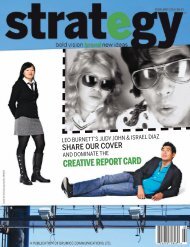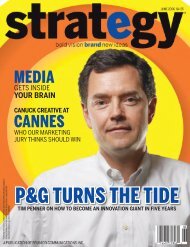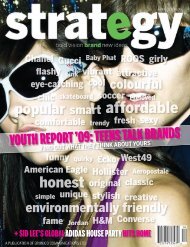THENEWRATPACK - Strategy
THENEWRATPACK - Strategy
THENEWRATPACK - Strategy
You also want an ePaper? Increase the reach of your titles
YUMPU automatically turns print PDFs into web optimized ePapers that Google loves.
From top: French Rabbit comes in tetrapak<br />
while Banrock Station is supporting salmon<br />
suppliers to come forward with innovative<br />
eco-friendly packaging.<br />
The fi rst to answer the call was French<br />
winemaker Blasé, whose vintage dated,<br />
varietal premium quality wine French<br />
Rabbit now comes in tetrapak containers.<br />
The LCBO’s marketing team joined forces<br />
with the vintner to create a launch strategy<br />
for the new product, says Clarke, who<br />
points out that the marketing message<br />
included several consumer benefi ts – “it’s<br />
lighter weight, it’s unbreakable, it’s great<br />
for the patio, but we were also very upfront<br />
with the environmental benefi ts in terms of<br />
waste reduction. The message on brochures was<br />
‘savour the wine, and save the planet.’” A dollar<br />
from every tetrapak of French Rabbit sold also<br />
went to the retailer’s Natural Heritage Fund, and<br />
specifi cally towards a program supporting the<br />
recovery of an endangered bird called the Eastern<br />
Loggerhead Shrike.<br />
He adds: “What our marketing people tell<br />
us is that the environmental message alone is<br />
not entirely effective at making the purchase<br />
choice. Consumers want to be good for the<br />
environment. But you need more than that<br />
to get the purchase. They want to see the<br />
value proposition.” The blend of benefi ts<br />
communicated to consumers via in-store<br />
efforts and billboard ads worked for French<br />
Rabbit. The LCBO achieved its six<br />
months sales projections in just a<br />
few weeks, and two million dollars<br />
worth of French Rabbit<br />
was sold between August and<br />
November 2005. Thanks to<br />
its success, there are now 30<br />
different enviro-packaged alcoholic<br />
beverages on<br />
the market, with<br />
another 40 or so<br />
expected to land<br />
on LCBO shelves<br />
within the next year<br />
or two.<br />
Like French<br />
Rabbit, the<br />
purveyors of many<br />
new products are<br />
donating proceeds<br />
to the LCBO’s fund<br />
including Bandit, a<br />
brand from California<br />
winery Three Thieves,<br />
which is supporting<br />
the creation of a<br />
Toronto-area habitat for<br />
frogs, and Australian<br />
winemaker Banrock<br />
Station, which will be funding efforts to<br />
reintroduce Atlantic salmon to Lake Ontario.<br />
The majority of these do-good projects are<br />
advertised through in-store signage. For the<br />
Banrock product, for example, the slogan on<br />
POP is “bring home the wine that brings back<br />
the salmon.”<br />
Adds Clarke: “We’re trying to engage our staff,<br />
customers and suppliers in our strategy in a<br />
positive, brand building way that will give them<br />
an emotional connection with what we’re doing.”<br />
Even retailers who historically have had a strong<br />
commitment to the environment are upping the<br />
ante. Toronto-based Roots was way ahead of its<br />
time when it introduced organic products in 1989,<br />
and today its organic line is being expanded, as<br />
are products with hemp and bamboo. As for the<br />
chain’s signature leather goods, more and more<br />
are vegetable tanned, which means they aren’t<br />
produced with toxic dyes.<br />
As Robert Sarner, director of communications<br />
and public affairs points out, founders Michael<br />
Budman and Don Green have always had<br />
a connection to wilderness, given that they<br />
conceived Roots during a camping trip in<br />
Algonquin Park. Sarner says this history gives<br />
the brand credibility to adopt environmental<br />
policies. “But also I think there’s even greater<br />
expectation. People hold you up to a higher<br />
standard, when you’ve nurtured your company,<br />
heritage and image closely with the outdoors,<br />
healthy living and active lifestyles.”<br />
To send an even stronger message of its<br />
environmental stance, the retailer opened a<br />
new concept store on Toronto’s Yonge Street<br />
last month built with eco-friendly products<br />
such as recycled wood and bamboo. It sells<br />
mainly environmentally responsible products. A<br />
signifi cant benefi t to this? Roots can charge 50%<br />
more for vegetable tanned skins versus regular<br />
leather goods, and 10% more for organic clothes.<br />
Sarner says the retailer is investing in ad support<br />
for its organics line; in fact, many of the T-shirts<br />
themselves carry slogans that spread the word.<br />
Furthermore, Roots has donated<br />
more money and time to environmental<br />
organizations in recent years, and sponsored<br />
Al Gore’s documentary, An Inconvenient<br />
Truth, which it promoted in stores. The<br />
retailer also backs the Toronto Green<br />
Awards, which celebrates contributions<br />
to the greening of Toronto, and Michael<br />
Budman is on the board of Robert Kennedy<br />
Jr.’s Waterkeepers Alliance, which works<br />
to protect waterways. Plus, the retailer<br />
sells bracelets to raise funds for the Stop<br />
Global Warming Fund, run by U.S.-based<br />
stopglobalwarming.org.<br />
Still, at the end of the day, people’s numberone<br />
concern is, “the product has to be appealing<br />
– it has to look and feel good, the price has to<br />
be reasonable, even if it is a bit more expensive,”<br />
notes Sarner. “The fi t has to be right.”














